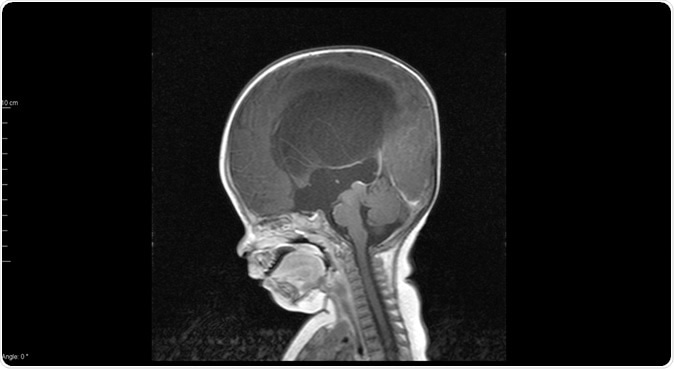A new study reported that using shunt tubing impregnated with two common antibiotics is effective in preventing infection after brain surgery to relieve hydrocephalus. This simple but highly effective practice could save millions of pounds, prevent devastating brain damage, and shorten hospital stay and antibiotic use duration.
Hydrocephalus affects about one in 500 babies at birth, and is the most frequent indication for brain surgery in childhood. It refers to a buildup of cerebrospinal fluid (CSF), the fluid which bathes the brain and spinal cord, around the brain. This compresses the organ and can cause permanent damage if not relieved. It can also happen in children or adults following a tumor which blocks the outlet of the CSF from the brain, or after meningitis.

Sagittal MRI T1 showed mark hydrocephalus with congenital aqueductal stenosis - Image Credit: O_Akira / Shutterstock
The problem
The surgery to relieve hydrocephalus is called shunt surgery, and consists of the implantation of a thin hollow pipe carrying excess CSF from the brain into the abdominal cavity, outside the intestines proper. This is called a ventriculoperitoneal shunt. Each year, the UK sees about 1300 shunt surgeries being performed.
However, this surgery is far from trivial. In about 15% of patients, the shunt is complicated by infection, especially when it is done on newborn babies and in children. This infection can affect the brain coverings (meninges) causing meningitis, which, even if detected early, requires prolonged and powerful antibiotic treatment, up to weeks of hospitalization, repeat surgery to clear the shunt if it is blocked by the thick gummy secretions or adhesions formed by the inflamed meninges, and permanent brain injury.
The solution
A team of researchers has now come up with a way to prevent the introduction of surgery through the shunt tubing – manufacturing antibiotic-incorporated shunts.
The new technology, called Bactiseal®, was tested in over 1600 children with hydrocephalus who received these shunts in 21 neurosurgical facilities, over 7 years. The £2.3 million study was called the BASICS trial (British Antibiotic and Silver Impregnated Catheters for ventriculoperitoneal Shunts). This is the largest trial for hydrocephalus ever.
The patients were randomly assigned to receive either standard shunts, shunts containing antibiotics (rifamycin and clindamycin) and shunts containing silver. All patients were followed up for 6 months to 2 years.
The researchers then measured the time to shunt failure due to infection, which was the primary outcome. The use of antibiotic-impregnated shunts was associated with only 2% of post-shunt infection compared to 6% with standard or silver-impregnated shunts. Adverse effects were also lowest in the antibiotic-impregnated shunt group.
The infection risk was greatest in children and very low in elderly patients. Most infections are due to Staphylococcus aureus and coagulase-negative staphylococci, which accounted for about 79% of all cases. The antibiotic-treated shunts were found to reduce this category of infections most significantly, while not affecting the rate of Gram-negative shunt infections noticeably, just as expected.
The benefits
Shunt failure occurred at the same rate in all groups, but the percentage due to infection was reduced in the antibiotic shunt group. This has a significant benefit on patients, however, as non-infectious shunt failure results in shorter hospital stays, lower duration of antibiotic use, and faster recovery with less neurologic damage.
This saved about 130 000 pounds per possible infection. Thus, adopting the antibiotic impregnated shunts for all patients going forwards could save about 7 million pounds each year.
Researcher Conor Mallucci said: "The results of our trial will have an impact on national and international hydrocephalus guidelines and policy. Using these antibiotic shunts will not only reduce potential harm to our patients but are also cost effective and should save healthcare providers millions of pounds avoiding countless unnecessary days in hospital.'
The report was published in The Lancet on September 12, 2019.
Journal reference:
Antibiotic or silver versus standard ventriculoperitoneal shunts (BASICS): a multicentre, single-blinded, randomised trial and economic evaluation. Conor L..Mallucci, Michael D. Jenkinson, Elizabeth J. Conroy, John C. Hartley, Michaela Brown, Joanne Dalton, Tom Kearns, Tracy Moitt, Michael J. Griffiths, Giovanna Culeddu, Tom Solomon, Dyfrig Hughes, & Carrol Gamble. The Lancet. https://doi.org/10.1016/S0140-6736(19)31603-4. https://www.thelancet.com/journals/lancet/article/PIIS0140-6736(19)31603-4/fulltext